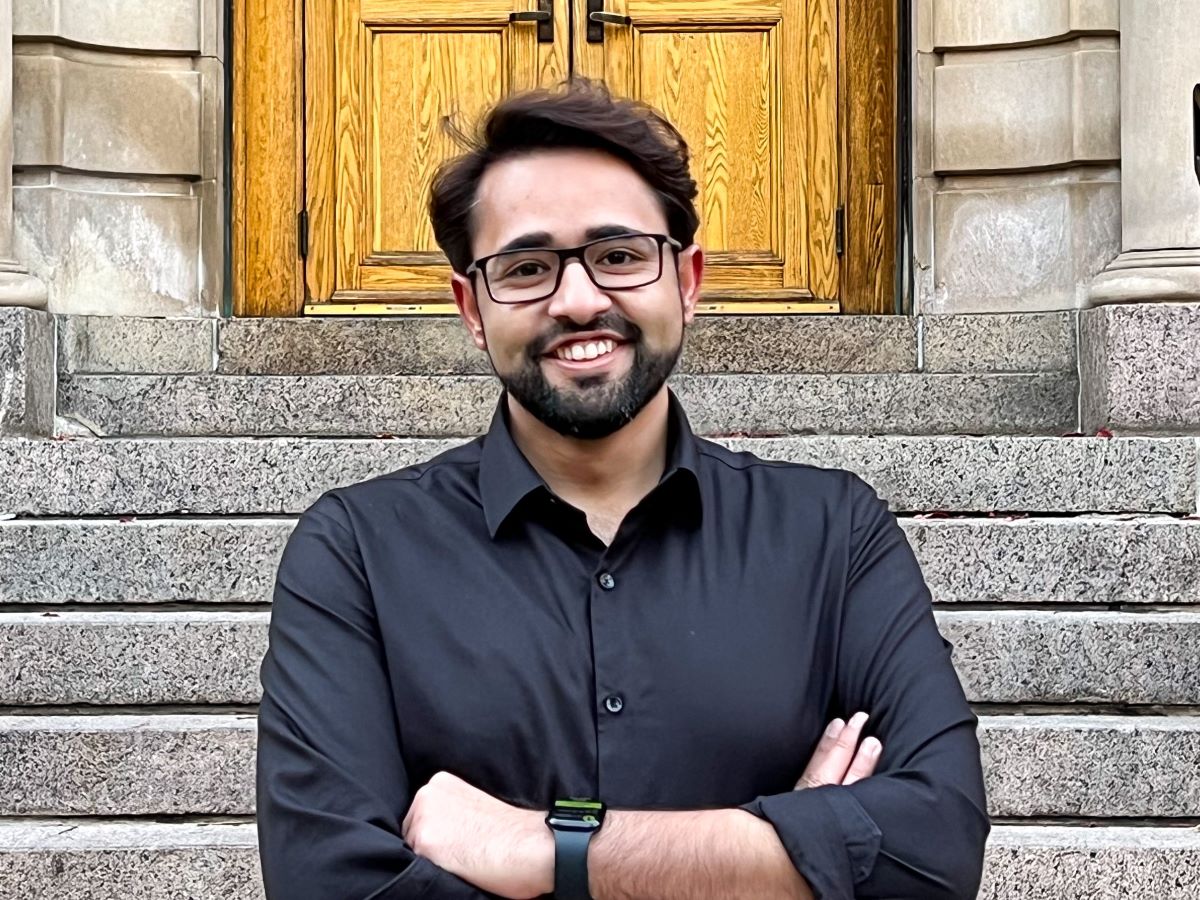Fall 2021 Convocation Spotlight: Amirali Bukhari, ‘21 PhD in Cancer Sciences (Department of Oncology)
Adrianna MacPherson - 16 November 2021

Amirali Bukhari, ‘21 PhD in Cancer Sciences (Department of Oncology)
Amir (Amirali) Bukhari’s path to becoming a cancer researcher began all the way back in a Grade 10 science class. “We had a chapter in the biology textbook that was all about cancer, and I was so fascinated by it. I just wanted to learn and know more about it,” he says. He moved to India from the Middle East to pursue his master’s degree, and was looking primarily at European institutions for his doctoral studies. However, one of his former colleagues, a new postdoctoral fellow here who was impressed by the research happening on campus, suggested that since Bukhari was looking at cancer-specific programs, he should consider the University of Alberta. Bukhari estimates he sent over 100 applications, all around the globe, and it was Armin Gamper’s lab at the U of A that ended up being the perfect fit.
A self-confessed workaholic, Bukhari paired his breast cancer research—a focus he selected partially due to his previous master’s research, and partially due to a personal connection, as his late grandmother had metastatic breast cancer—with a variety of volunteering roles on campus. He served as assistant chair of the Cancer Research Institute of Northern Alberta (CRINA) Research Day organization committee, as a member of the CRINA trainee committee, a grad student representative for the Cross Cancer Institute’s animal care committee, and a volunteer for departmental tours to students, patients and volunteers. When he is hit by the need to step away from the lab and destress, he makes the most of one of Edmonton’s prized features, the river valley, walking the trails and finding different spots to appreciate the beauty of nature.
We spoke to Bukhari about his doctoral studies and time at the U of A, where he delved deeper into the breast cancer research he started during his master’s studies. From battling burnout to winning multiple scholarships, including the Alberta Cancer Foundation’s Dr. Cyril M. Kay Graduate Studentship, his path has been full of both challenges and triumphs—he reflects as he moves onto his next chapter. Read more about his experiences and mentorship-focused advice for future graduate students.
What inspires you about your chosen field?
I am fascinated by the complexity of breast cancer. The more we learn about it, the more complex it turns out to be. Every time I learn more about a particular subtype of breast cancer, I am left puzzled at how different it can be from the other subtypes. The saying in the field is that breast cancer is not one disease, but many. The mystery keeps my mind engaged at all times and every little discovery makes me want to know so much more!
Who have some of your mentors been?
I am forever grateful to Doctors Abhijit De and Pritha Ray (Molecular Functional Imaging Laboratory, ACTREC, Tata Memorial Centre, Kharghar, Navi Mumbai, India) for introducing me to the world of preclinical molecular imaging. At the U of A, I am extremely thankful to Armin [Gamper]. He gave me so much freedom to explore new ideas in the lab. It was amazing to have someone who shared similar levels of excitement when it comes to exploring new things.
What impact did your involvement in CRINA have on your studies?
CRINA is a fantastic interdisciplinary organization, connecting so many researchers on campus working on cancer-related topics. It is often easy to get so lost in your own little research bubble that you don’t get opportunities to explore and see the amazing research going on across campus. I am grateful to CRINA for connecting the cancer-research community on campus through organizing research days and for enabling many young researchers like me to foster new collaborations.
What advice would you give to graduate students?
Throughout my PhD, I would see many fellow graduate students getting frustrated with their undergraduate students because experiments wouldn’t work to their liking. I understand that graduate-student life can be frustrating with experiments failing left and right. However, mentoring undergraduates is an important part of that life. It always helped me to put myself in the other person’s shoes and remember that I was once like them. When I first started back in India, I knew nothing about working in a lab. I was grateful that I had very patient mentors who went above and beyond to help me understand concepts. I try to do that for my students. Not everyone is the same or learns the same way, so you need to get creative and find ways to teach. “A candle loses nothing by lighting another candle.” Be the light that guides your students and ignites their excitement for research.
What do you wish the average person would know about research that they perhaps don’t?
We’ve had patients and volunteers who would come to visit the lab during departmental tours, and once you start explaining your research, some of them would casually comment, “This is nothing like what they show in the movies,” to which I often laugh and respond, “Absolutely not.” In reality, research advances in steps, not in leaps. It is about curiosity, about wanting to find the answer to questions which invariably will lead to more questions. It takes a lot of time, patience and persistence to actually get the answers you want.
What’s the next chapter for you?
I recently started as a research scientist and biosafety officer for Alberta Health Services at the Cross Cancer Institute. I have always been very interested in translational research and as part of my job duties, I will have the opportunity to work closely with clinician scientists there, in addition to taking on new responsibilities as a biosafety officer. I am fortunate for this opportunity and I am excited to see where it takes me from here.